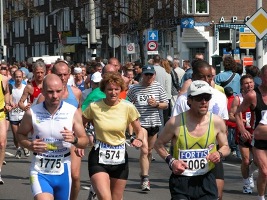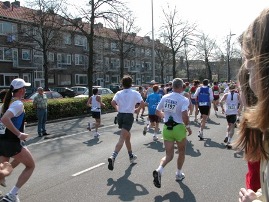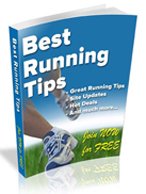- Newsletter|
- What's New |
- About|
- Contact|
Like this site:
|
Home What's New? Newsletter |
BeginnersBeginnersWeight Loss Beginner Run Programs |
Training & ToolsTrainingTips Calculators Injuries |
Race Distances5K10K Marathon |
...And Other Things...QuizBooks Questions Quotes |
[?] Subscribe To This Site
Running Chest PainMost commonly, it is a severe crushing or squeezing sensation in the neck and chest. The pain can move towards the neck, down to the shoulder, arm or head, depending on the causes. This may be life threatening. Contrary to many people's belief, running chest pain is not always related to heart attack (although the most critical ones are) and may actually be far from dangerous. This article will explain the three major reasons for chest pains, its underlying causes, symptoms, corresponding immediate care, treatment and prevention. Running Chest Pain #1: Heart Attack Let's start with the most serious one. Heart attack and cardiovascular diseases are considered to be the number one cause of death in the Western world. It can go from mild to severe, depending on the cause, and survival depends upon the medical treatment given.
Let's start with the most serious one. Heart attack and cardiovascular diseases are considered to be the number one cause of death in the Western world. It can go from mild to severe, depending on the cause, and survival depends upon the medical treatment given.
Causes Causes of a heart attack or coronary artery disease (or the amount of cholesterol buildup somewhere along the coronary arteries), smoking, diabetes, obesity, use of cocaine stimulants, etc. In other words, an unhealthy lifestyle. However, a heart attack may also have genetic causes. Symptoms Symptoms include shortness of breath, vomiting, nausea and increased sweating, unexplained exhaustion and dizziness. Immediate Care While waiting for medical assistance, make the patient chew at least 160 mg of aspirin (half of a regular aspirin), this may lessen the possibility of death or the severity of the heart attack. Treatment After reviving the patient medical proceducres include angioplasty or a cardiac bypass. Prevention Increase physical activity, maintain a healthy diet so as to also maintain a healthy weight, severely decrease or avoid the intake of alcohol and stay away from any stimulants such as cocaine and cigarettes. Running Chest Pain #2: Aortic DissectionThe aorta supplies blood to the vital organs of the body such as the lungs, brain, kidneys and intestines. Even a small tear in the aorta will be enough to make it malfunction. A tear in the aorta causes it to bleed,  which consequently interrupts the flow of blood, thus causing the entire body to stop functioning properly. which consequently interrupts the flow of blood, thus causing the entire body to stop functioning properly.
Causes uncontrolled high blood pressure, smoking or use of cocaine or other similar stimulants, old age, congenital heart disease and pregnancy, among many others. Symptoms Fainting, shortness of breath, abdominal cramping, and pain that radiates up to the shoulders. Immediate Care Patient should be laid flat in an open space so as to allow more oxygen to pass through as you wait for medical assistance. Treatment Medications that dilate the arteries so as to lessen the possibility of internal bleeding. Prevention Continuous monitoring of blood pressure and avoiding too much physical activities. With medical assistance some exercise can be done, but you need to make sure you take it easy and build up the exercise slowly over time. Running Chest Pain #3: AnginaAngina is the narrowing of one or more coronary arteries that reduces the supply of blood to the heart vessels. Cause When a person does a physical activity, the heart needs more blood supply, and when it does not receive the amount it needs because of the narrow path through the coronary arteries, it aches. Symptoms shortness of breath, severe pain in the chest. Immediate Care A patient who has a history of angina possibly has nitroglycerin tablets with him. If he does, place one under his tongue. Treatment The nitroglycerin tablet is the most common medication used for this disease. If situation becomes worse, this medication is given through IV (intravenous therapy) and admitted to a hospital. Prevention Engaging into a healthier lifestyle, but making sure this is done with care. So avoid too much physical activity at once (this will again cause the heart to ask for more blood than the arteries can get to it) and build up slowly. Slow, easy running and run/walk programs are a good alternative as is slow bike rides, walking, easy swimming etc. Foodwise, reduction of sugars etc is key. There may be other problems causing chest pain like issues with the lungs, heart, esophagus or muscles. Whether the chest pain is life-threatening or not, you always need to have yourself evaluated by a medical doctor. You need to do the maximum possible to ensure your safety and reduce the risk of more complicated diseases. Take chest pain seriously. Better safe than sorry. Wish to get more running tips? Subscribe to the Best Running Tips Newsletter or to my site blog. Go from Running Chest Pain Page to Running Injuries Page Go from Running Chest Pain Page to Best Running Tips Homepage Running Injuries Running Injury Prevention Foot Injuries: Foot Pain | Black Toenail | Stress Fractures | Posterior Tibial Tendonitis | Heel Injuries: Heel Pain | Achilles Tendinitis | Heel Spur / Plantar Fasciitis | Knee Injuries: Knee Pain | Iliotibial Band Syndrome (ITB) | Leg Injuries: Leg / Calf Cramps | Shin Splints | Hamstring Injury | Hip Pain Upper Body Injuries: Nipple Chafing | Side Stitch | Back Pain | Chest Pain Like this page: |
|

|

|

|
|



